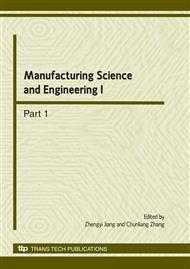p.2455
p.2459
p.2465
p.2469
p.2473
p.2477
p.2481
p.2485
p.2491
Improved Adaptive Genetic Algorithms for Job Shop Scheduling Problems
Abstract:
In this paper, the adaptability of the genetic algorithm (GA) is considered. Two improved adaptive genetic algorithms (AGA) which are called Ch-AGA and Th-AGA for short are proposed based on the previous AGA. The crossover probability and the mutation probability of the Ch-AGA and the Th-AGA are non-linear changed between some a certain region, and adopted the mathematical function of chx and thx respectively. The two improved adaptive genetic algorithms are used to solve the classical job shop scheduling problems and the results indicate that the algorithms are more effective and more efficient than previous AGA, and should be used in practical applications.
Info:
Periodical:
Pages:
2473-2476
Citation:
Online since:
March 2010
Authors:
Price:
Сopyright:
© 2010 Trans Tech Publications Ltd. All Rights Reserved
Share:
Citation:


